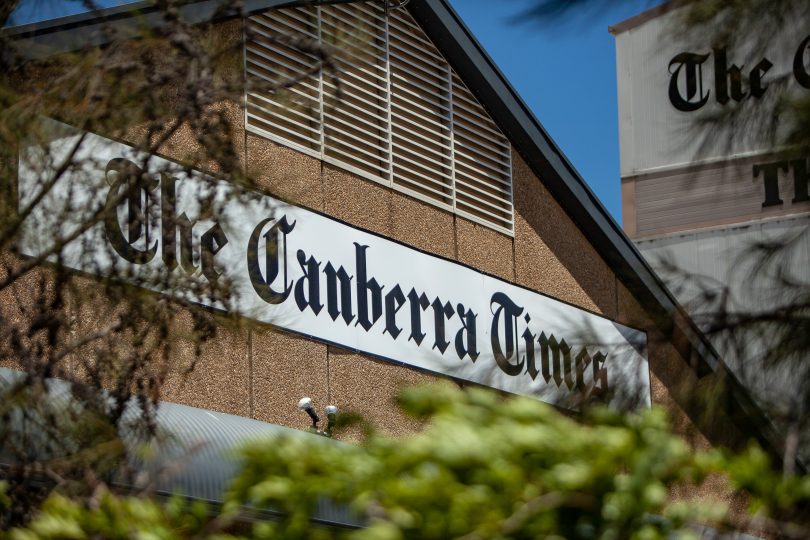
The Canberra Times will now be printed on News Corp presses. Photo: File.
After consultations with their printing staff in Canberra and several other sites, Australian Community Media has announced that they will cease printing permanently here in Canberra, at Ballarat and Murray Bridge.
The Canberra and Murray Bridge sites will close at the end of August, while the Ballarat plant will cease printing on 2 October.
There will be redundancies associated with the closures although ACM has not disclosed how many staff will be affected.
A decision has not yet been made about the printing facilities at Wodonga, but ACM chief Antony Catalano had some startling news for media consumers.
“As part of this change, we have entered into collaborative agreements with News Corp Australia that will see us use each other’s printing networks,” he said.
Mr Catalano prefaced the announcement in his own mastheads with a lengthy reflection on his early career as a journalist, and the days when the printing presses rolled through the nights at major newspapers.
“But that’s not the commercial reality we face today in Australian publishing,” he said.
Printing was initially paused at Fyshwick in April, at the same time as many regional newspapers ceased to appear. Regionally aggregated online versions appeared for three months and while some ACM titles are now printing again, the future of many mastheads remains uncertain.
A public petition organised by the Media Entertainment and Arts Alliance was signed by over 5,000 people and ACM’s union delegates argued strongly for staff to return to work.
Media blog Mumbrella reports that during stand downs, ACM contacted a number of employees it incorrectly assumed were eligible for the government’s JobKeeper program, asking for the “overpayments” to be repaid. The union has written to ACM asking it to cease attempts to recoup these amounts.
The Canberra Times’ relatively small presses were also used to print low circulation non-daily rural and regional newspapers, but observers believe it’s unlikely that the News Corp presses would be turned to print runs of 1000 or less, potentially spelling the end for the smallest mastheads in the stable.
But Mr Catalano has argued that the decision to shutter the presses could benefit the news media nationally, creating savings in printing and distribution as print centres are rationalised.
“To be clear: this is not ACM stepping away from publishing printed copies of our newspapers. We know our trusted newspaper journalism has impact and influence in the communities we serve,” he said.
“In fact, these practical, sensible arrangements to cut duplication of press facilities and delivery truck routes are designed to make our newspapers stronger and more sustainable into the future.”
The news comes hard on the heels of news last week that a major part of Mr Catalano’s long-anticipated real estate play was coming to fruition. ACM will offer real estate agents and vendors packages including print advertising and a listing on Realestateview.com.au.
Described as an “ambitious digital property strategy”, the bundles will be offered in a number of major regional centres, although Canberra was interestingly absent from the list.
Speculation around Mr Catalano’s real estate intentions have been rife since he acquired the former Fairfax regional assets from Nine last year. Many observers wondered if his main intention in acquiring the 160 regional mastheads was to deploy them as tools in a real estate return game after leaving Domain in acrimonious circumstances.
Mr Catalano has denied this, pointing to his existing partnership with Domain, and its majority owner, Nine, which is still operational.
Of the News Corp deal, Mr Catalano said: “We’ve parked egos at the door and left behind the traditional media rivalry so we can get better, more rational, outcomes around printing and distribution.”
And, he added, “we don’t need to own expensive factories to achieve our goals”.
“Obviously any job lost in any industry is regrettable. The decision to shut some print sites has certainly not been taken lightly,” he said.
Original Article published by Genevieve Jacobs on The RiotACT.


What's Your Opinion?